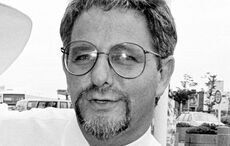After what has been referred to as a “lost year” Pope Francis’ sex abuse commission has made progress this week.
During a meeting last weekend the commission approved its legal statutes, proposed new members and divided up work to focus on reaching out to survivors, holding bishops accountable and keeping pedophiles out of the priesthood.
Over the past year it seemed that the commission, established by Pope Francis, had languished and lacked organization, a clear mission, office space, funding and a full membership roster.
On Monday, Marie Collins, an Irish sex abuse survivor, told the AP they had made progress during their first meeting after the Pope assigned the Vatican's sex crimes prosecutor, Monsignor Robert Oliver, to the post of full-time sescretary to the commission.
The nine commission members have approved their provisional statutes laying out the scope of their work. This will now be put to Francis for approval.
They finalized a list of other member candidates whom the Pope must also approve. There will be fewer than 20 commissioners altogether, including experts from other fields and geographic locations and another survivor of abuse.
The commission will soon move into a permanent office and divide into working groups focusing on various goals, including the training of priests, education outreach, accountability, guidelines and policy issues and reaching out to survivors.
Collins told the AP “Listening to their views on what is wrong and what needs to be put right has to feed into the overall learning.”
In March the Pope named the initial members of the commission after receiving criticism from victim groups for having ignored the sex abuse issue. The commission aims to provide the Catholic Church with advice on best practices of how to keep children safe, how to keep abusers out of the priesthood and how to take care of abuse victims.
The commission’s head, Boston Cardinal Sean O'Malley, pledged that the group will develop "clear and effective protocols" to hold those bishops who covered up abuse accountable.
Collins admitted that she had been frustrated by the slow pace of work earlier in the year. However, she said after the progress this week she is hopeful.
She said, “I want to see change as fast as possible. But on the other hand if we're going to bring in change, it has to be the right change and it has to be well thought out and it has to be something that will last.
“There's no point in rushing something into place and then finding it has flaws."
Collins helped to organized Pope Francis’ meetings with survivors this summer and hopes that there will be further encounters of this sort. She said that after the July meetings the Pope “gets it.”
She said, “No matter how much you read, or learn or know about abuse, nothing brings it home to you like speaking to someone who has actually experienced it, and hearing what it has done to their lives and their family.”
Currently bishops from around the world are attending two weeks of meetings, called by Pope Francis, to discuss the issues of contraception, homosexuality, marriage and divorce.




Comments